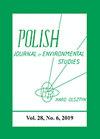全球化与环境质量的联系:通过量值回归分析探究异质性效应
IF 1.3
4区 环境科学与生态学
Q4 ENVIRONMENTAL SCIENCES
引用次数: 0
摘要
本研究探讨了全球化对环境质量的影响,明确侧重于 KOF 瑞士经济研究所提出的规模、技术和构成方面。通过对 115 个发达国家和发展中国家的大量样本进行分析,使用量子回归法了解全球化的不同层面如何影响不同层次的环境退化。结果表明,根据人均二氧化碳排放量(CO2PC)的分布情况,全球化对中低层量值国家的排放量有积极影响,但对高层量值国家的影响则变为消极。此外,全球化的每个维度对排放都有影响:(i) 除第 90 个百分位数外,可再生能源消费对大多数百分位数的环境质量都有显著的负面影响。(ii) 外国直接投资流入对较低百分位数的环境质量有积极影响,但对较高百分位数的环境质量有消极影响。(iii) 城市化最初在第 50 个百分位数与环境退化呈负相关,但在第 75 个百分位数则转为正相关。总体而言,全球化使面临严重环境退化的国家受益,而保持高质量环境的国家从全球化中受益不大。这些发现为政策制定者在考虑各国不同的经济和环境条件时制定有效的环境政策提供了宝贵的启示。本文章由计算机程序翻译,如有差异,请以英文原文为准。
Nexus of Globalization and Environmental Quality: Investigating Heterogeneous Effects through Quantile Regression Analysis
This study examines the effects of globalization on environmental quality, explicitly focusing on the scale, technique, and composition aspects proposed by KOF Swiss Economic Institute. A large sample of 115 developed and developing countries is analyzed to understand how different dimensions of globalization impact environmental degradation at various levels, using the quantile regression method. The results indicate that globalization has a positive effect on emissions at lower and middle quantiles, but at the upper quantiles, the effect becomes negative, based on the distribution of CO 2 per capita (CO2PC). Additionally, each dimension of globalization has its influence on emissions: (i) Renewable energy consumption significantly negatively impacts environmental quality across most percentiles, except for the 90 th percentile. (ii) Foreign direct investment inflows positively affect environmental quality at lower quantiles but negatively at higher quantiles. (iii) Urbanization initially correlates negatively with environmental degradation at the 50 th percentile, but this relationship turns positive at the 75 th percentile. Overall, globalization benefits countries facing environmental degradation seriously, while countries maintaining a high quality environment have not benefited much from globalization. These findings offer valuable insights for policymakers in developing effective environmental policies considering diverse economic and environmental conditions across countries.
求助全文
通过发布文献求助,成功后即可免费获取论文全文。
去求助
来源期刊

Polish Journal of Environmental Studies
环境科学-环境科学
CiteScore
3.10
自引率
11.10%
发文量
430
审稿时长
4 months
期刊介绍:
One of the most important challenges facing the contemporary scientific world are problems connected with environmental protection. Intensive development of industry and agriculture has led to a rise in living standards on one hand, but an increase in environmental degradation on the other. This degradation poses a direct threat to human health and life. Solving these ever-increasing problems which seriously endanger our civilization require the united efforts of scientists and field researchers of many branches.
The "Polish Journal of Environmental Studies" publishes original papers and critical reviews on the following subjects:
-Basic and applied environmental pollution research, including environmental engineering
-Pollution control of atmospheric, water (marine and fresh), soil and biological materials
-Determination of harmful substances, including their metabolic breakdown patterns
-Analytical methods for metabolic breakdown patterns or other chemical degradation patterns in the environment and in biological samples
-Development of new analytical methods, instruments and techniques for controlling pollutants
-Circulation of pollutants in the environment and their effect on living organisms
-Environmentally oriented catalysis
-Hazards to human health and safety
-Waste utilization and management
-Land reclamation
-Conference reports, scientific and technical reports and book reviews
 求助内容:
求助内容: 应助结果提醒方式:
应助结果提醒方式:


